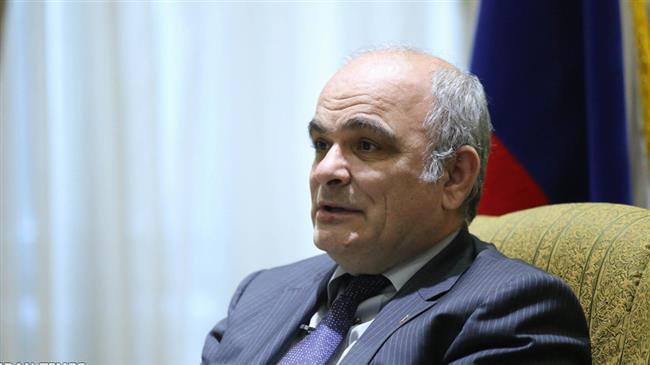
RNA - In an interview with the Russian daily Kommersant on Wednesday, Levan Dzhagaryan said that Iranian advisors, along with the Russians, are participating in a counter-terrorism battle in Syria.
“First of all, I would like to remind you that the Iranian military presence in Syria is legitimate. The Iranians are there, as well as the Russian military, at the invitation of the legitimate government of the Syrian Arab Republic and are participating in the operation to destroy terrorists,” he said.
Asked about Israel’s recent call on Russia to remove Iranian advisers from Syria, Dzhagaryan said that Moscow was “naturally concerned” about a possible military confrontation between the two sides, noting, “We do our best to prevent this. To prevent the escalation of the conflict.”
The Russian envoy further emphasized that pressure does not work on Iran, saying, “Iran is not a country that you can put pressure on. This is a big state, pursuing an independent foreign policy. Work with Iranians can only be a method of persuasion.”
Last week, Israeli Prime Minister Benjamin Netanyahu held a private meeting with Russian President Vladimir Putin in Moscow.
The Israeli premier said Tel Aviv “won’t take action against” the government of Syrian President Bashar al-Assad, urging Moscow to “get the Iranians out,” Reuters quoted Netanyahu as telling Putin in the meeting.
Israel has frequently attacked military targets inside Syria in an attempt to prop up the terrorist groups that have been suffering defeats at the hands of Syrian government forces.
On April 9, an Israeli airstrike against the T-4 airbase killed more than a dozen people, including seven Iranian military advisors. Iran pledged that it would punish Israel for the deadly air raid.
In the wake of Syria’s recent advances in the south, Israel has significantly beefed up its military presence on the occupied side of Syria’s Golan Heights, deploying more military equipment and forces to the region. The regime has also threatened more strikes against Syrian soil.
Besides Tehran, Moscow has been carrying out an aerial bombardment campaign as a cover for ground operations by the Syrian army against a myriad of terror groups seeking to oust the Damascus government. Moscow, too, has military advisors in Syria. It also runs a number of military bases in the country.
The Russian diplomat further said, “For us, Iran is a friendly country. We cooperate in various spheres, and in some of them, for example, in terms of ending the war in Syria and launching a full-fledged political settlement process, Iran is one of our key partners for us.”
‘Russia doesn’t recognize US bans’
Elsewhere in the interview, the Russian ambassador was asked about Tehran-Moscow relations as Washington is seeking to increase economic pressure on Iran after its unilateral withdrawal from the 2015 nuclear deal, officially known as the Joint Comprehensive Plan of Action (JCPOA).
“Our trade and economic relations are developing quite actively, we have a number of large projects,” he said. “To date, despite threats from the US, I see no obstacles to the implementation of these projects. Work on them continues in normal mode.”
After Washington’s exit from the JCPOA in May, the administration of US President Donald Trump pledged “the highest level” of economic bans on the Islamic Republic. It also embarked on a fresh fearmongering campaign and threatened businesses active in Iran with hefty penalties.
Asked whether Russia would continue to buy Iranian oil when the American sanctions snap back into place, Dzhagaryan said, “We do not recognize unilateral American sanctions, from our point of view, they are illegal.”
According to Press TV, he also confirmed that the Islamic Republic “firmly adheres to its obligations” under the JCPOA and that the International Atomic Energy Agency (IAEA) has repeatedly verified Iran’s compliance with the agreement.
“Iran remains in this deal for the time being, and we actively encourage it to adhere to all its provisions. It is very important that the leading European countries – Great Britain, France, Germany – also recognize that Iran fulfills its obligations. In this respect, their positions differ from the position of the United States of America,” he said.
“We, with our Chinese and Western European partners, have made and will continue to make efforts to develop such mechanisms that would allow Iran to continue to derive economic benefits from compliance” with the JCPOA, he added.
Tehran has conditioned its stay in the deal to a set of practical European strides to make sure Iran’s dividends from the deal would not be affected when US sanctions return.
847/940